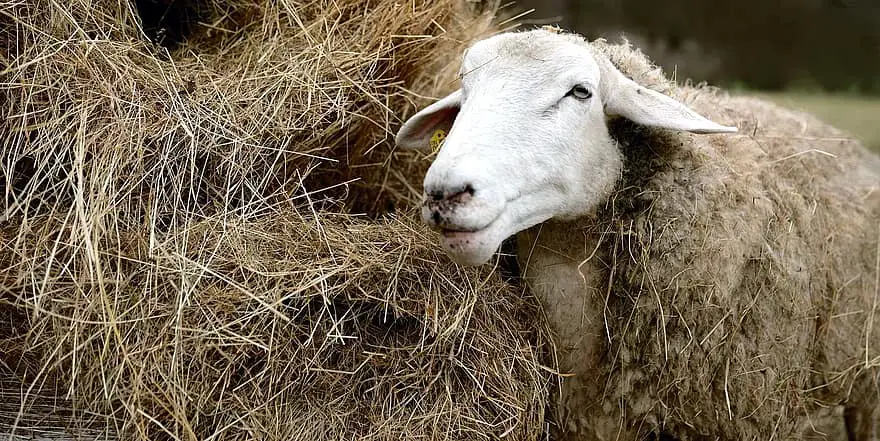Sheep dietary plans normally consist of pastures. The challenge faced by farmers is that good pasture diets are difficult to maintain, especially during dry seasons. It is therefore a common practise to supplement pasture based dietary plans with hay. Since the digestive system of ruminants is naturally designed for pasture based diets, sheep can eat hay. Hay feed is an ideal solution for farmers experiencing dry, low quality pastures. In fact, hay can be used as a feed replacement for pasture. Note that the nutritional value of hay depends on the type of grass available. Some hay such as alfalfa and timothy are more nutritious when compared to most grass feeds while others are lacking in essential nutrients and minerals. It is therefore advisable for farmers to have some form of understanding on the different types of hay available to sheep so as to offer relevant supplements or additives when necessary.
Table of Contents
Nutritional Value of Hay
Forage that has been cut and cured for use as livestock feed is known as hay. Sheep can feed on hay which serves as their primary source of nutrients during the dry season when there is shortage of forage. As already pointed out, the nutritional value of hay depends on the specific type of grass and its maturity during the harvesting period. Hay that is well stored and covered is said to be more nutritious in comparison to that left outside in the open. According to experts on the subject matter, hay is a moderate source of protein and energy for sheep. Sheep can feed on hay that is derived from grass or legumes. An important factor to be aware of is that legume hay usually has 50 to 70% more protein and 3 times as much calcium as grass hay. That being said, it is not always the case that legume hay is superior to that of grass. Good quality grass hay that is more digestible and palatable is generally preferred over legume hay of moderate quality. Although sheep can eat hay as replacement of pasteurised diets, it is advisable for farmers to make sure that excessive feeding does not occur. This is because overconsumption of hay such as alfalfa and timothy can cause a number of health related issues, particularly digestive problems like bloat. Since sheep can eat hay made from both grass and legumes, it is necessary for breeders to be aware of their various types. The following are grass and legume hay examples:
| Grasse Hay | Legume Hay |
| Brome grass | Alfalfa |
| Native grasses | Birdsfoot trefoil |
| Orchard grass | Cow peas |
| Timothy | Peanut |
| Rye grass | Red and White clover |
| Reed canary grass | Soybean |
| Tall fescue | Vetch |
Hay Diets for Physiological Development
Sheep can eat hay as a source of feed when pasteurised diets are in short supply. Hay is often a good source of energy needed by sheep to grow and develop as well as to carry out their normal daily bodily functions. In fact, energy is needed for all operation including walking, eating and production. Without sufficient energy, livestock are susceptible to diseases and infections. Hay is also a source of roughage needed for efficient digestion of feed. To add on, sheep can feed on hay for the sole reason that it the basis of all nutrients required for their physical development. Depending on the type of hay, sheep are provided with protein and calcium needed for muscle, bone and teeth development. Non pregnant sheep can eat hay of moderate quality for maintenance purposes. Grass hay usually provides sufficient nutrients to mature rams. Ewes in late gestation are often given grass hay that is combined with legume hay. This is done to meet their additional demand of calcium and protein. Note that sheep dietary requirements are based on weight instead of volume and so hay should be purchased according to weight. The downside of using hay dietary plans is that it is quite expensive; this is the reason some farmers prefer skilled grazing systems like rotational grazing to ensure that pasture is available throughout the year.
Hay Diets for Health Sustenance
Sheep can eat hay to prevent health issues that may arise from consumption of insufficient, poor quality pasture. Since hay provides the basis of all essential nutrients and minerals, it allows for blood synthesis, hormone structure, normal reproduction and vitamin synthesis as well as enzyme formation. Hay also helps to maintain the integrity of the immune system hence sheep are well protected from diseases. Despite the fact that sheep can feed on hay to sustain their health, this may not be possible if relevant supplements are not offered. Most types of grass and legume hay lack certain nutrients and minerals or are insufficient for sheep dietary requirements. It therefore becomes necessary to combine hay with supplements or additives rich in lacking nutrients. Also, it can never be over-emphasized that sheep must not be given excess hay as it may cause a number of health related issues.
What Hay Is Best For Sheep?
As noted earlier on, the quality of hay differs. This basically means that some types are more nutritious thus have additional benefits to livestock. Research studies indicate that the best hay for sheep includes that derived from legume plants as it is among the most nutritious. Legume hay includes alfalfa, various types of clover, vetch, trefoil, and soybean meal as well as cows peas. These have slightly higher levels of vitamins, calcium, protein and digestible energy than grass hay. Sheep prefer fine, leafy hay; alfalfa is said to be the best feed for sheep. However, the downside of using this type of hay is that excess feed causes a number of health issues such as bloat. Cereal grains make good hay, provided they are cut while still green and growing.
How Much Hay Should A Sheep Eat Per Day?
Since hay provides the basis of livestock feed, especially using the dry season, farmers ought to have relevant knowledge on appropriate rations for sheep. This is also important because excess feed can cause adverse effects on health, reproduction as well as production. The same applies when sheep are given insufficient feed rations. According to research studies, ewes up through 15 weeks of gestation should receive approximately 2kg of good quality grass or legume hay daily. In the last 4 weeks of the gestation period, it is advisable to provide about half a kg of corn supplements. During the lactation stage, sheep should receive about 2.3kg hay and roughly a kg of 15% crude protein grain mix. For rams, 3 to 3.5 kg mixed grass and legume hay is sufficient to meet their daily nutritional requirements.

